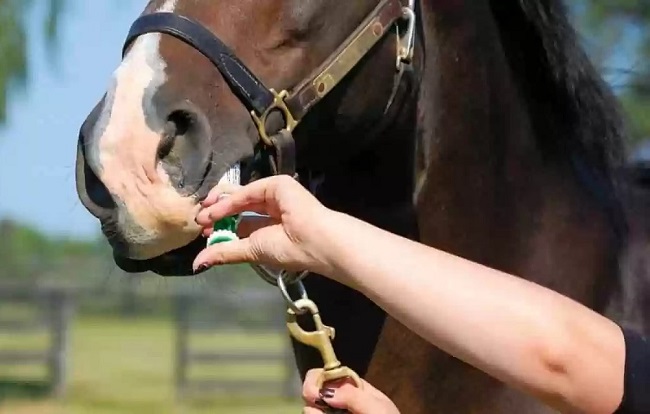
It’s been ingrained in the minds of most horse owners to deworm their adult animals every 6-8 weeks. But according to one equine veterinarian at the University of Illinois Veterinary Teaching Hospital in Urbana, Dr. Dennis French, who has studied equine parasites extensively, this long-held tradition, “is simply not true.” You would never randomly grab an antibiotic off the shelf to treat an infection if you did not know what the infection was and what drug is appropriate to cure it. There are hundreds of antibiotics on the market and each one is targeted for a particular type of bacteria. Choose the wrong drug and you are wasting precious time and money, not to mention the fact that you are exposing yourself to unnecessary chemicals.
This same reasoning carries over into the philosophy of deworming horses. There are several equine dewormers on the market that treat various parasites. In addition to having different worm targets, they have varying efficacy lengths. For example, one dewormer may work for 30 days and another may last for 3 months. This information has led Dr. French to develop his own equine deworming protocol. It’s quite simple: deworm all horses in the spring, and then find out what horses in your herd are the “big shedders” and work on controlling them. Twenty percent of the horses in a herd shed 80 percent of the eggs. So, at most farms, there really are only three to five horses that are infecting the rest of the bunch. Work on eradicating the worms in those animals, and you eradicate the worm problem from its source.
To follow this program, deworm all horses in the spring, and then a few weeks later, run a fecal on all horses to see which are the big shedders. Then, with your veterinarian’s help, tailor your deworming program to target the horses and specific worms you have on your farm. Every farm is unique, there is no one cookbook formulation to use on all horses. The plan isn’t just good on paper, it has been used successfully in practice at several large boarding and breeding farms. In addition to getting to the heart of your parasite problem the plan offers other benefits.
It decreases pasture contamination by knocking out the worms in the highest shedding horses. It saves money and time, prevents resistance; and prevents the unnecessary administration of chemicals to your horses. In the end, it’s easy to grab a random dewormer off the shelf each month and give it to all your horses. But the next time you find yourself pushing the plunger on that deworming syringe, ask yourself, “Is this really necessary?” For more information on deworming adult horses, please contact your local veterinarian.
Provided by Dennis D. French, DVM, DABVP
Crazy Horse Laws
Although they probably aren’t enforced, these laws concerning horses are apparently still active.
In Pocataligo, Georgia, horses aren’t allowed to be heard neighing after 10:00 pm
Paradise, California, retains a most unusual law that says it is illegal to let a horse sleep in a bakery within the limits of the community.
In Sutherland, Iowa, a law governs how horses may be seen when on the streets during evening hours. The animal must always have a light attached to its tail and a horn of some sort on its head.
Related Articles & Free Email Newsletter Sign Up


Comment here